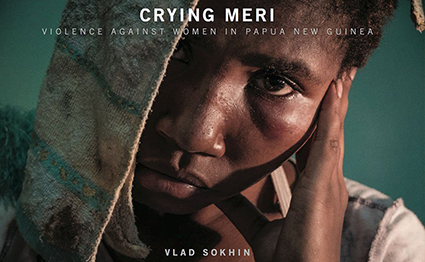
Ron Cerabona, Arts reporter for The Canberra Times
CANBERRA (The Canberra Times/Pacific Media Watch): Photojournalist Vlad Sokhin has risked his life to document and raise awareness of gender and sorcery-related violence in Papua New Guinea. One of the results of his work, which he has undertaken since January 2012, was the book Crying Meri: Violence Against Women in Papua New Guinea.
It was launched at Parliament House in Canberra, Australia, earlier this month in partnership with international aid agency ChildFund Australia. It was also launched on Friday in Auckland in partnership with Amnesty International.
One of the women whose story he documented was Rasta, who lives in the Highlands of Papua New Guinea.
"About 10 years ago, she was accused of sorcery by her neighbours after the death of a young man. At his funeral, a crowd set upon her but she managed to escape," he said.
"A young man followed her to her house and tried to cut off her head with a machete. She held up her hands to protect herself and one of them was cut off."
She spent two days in her house – "she said God saved her" – before relatives took her to a hospital in another town.
"She had to go back to the community – she had nowhere else to go."
Prosthetic hand
More recently, a doctor has fashioned a prosthetic hand for her, so she has been able to carry water and do other essential tasks, and the man who cut off her hand came to her daughter and said he was sorry.
"He couldn't come and talk to her directly."
"Meri" is pidgin for "women" and Rasta's story was just one of many the Russian-born Sokhin, 33, encountered in his travels, during which he interviewed and photographed more than 100 people – victims, perpetrators, police, and human rights defenders.
During that time, he said, "There were several attempts to rob me and one attempted carjacking. A couple of times I was in the middle of gun shooting and the police shot at me as well."
Asked why there was such a culture of violence against women in Papua New Guinea, he said, "I'm an outsider, not from Papua New Guinea, not an anthropologist. From my experience there are many reasons for that. Many men are still tribal and have a warrior mentality."
Tribal fights
Tribal fights still took place and women were often the targets, he said.
Another big factor, he thought, was the lack of education, especially in remote areas.
Sokhin worked on his own and in collaboration with several print and online media, as well as with the United Nations and international NGOs. He worked on several multimedia features and short documentaries and images from Crying Meri were adopted by the United Nations' educational campaigns and were also used by Amnesty International, Oxfam, ChildFund Australia, World Vision and other organisations that support victims of gender-based violence in PNG.
The Crying Meri book was launched in September 2014 at Visa Pour L'Image photojournalism festival in France and in Papua New Guinea's Parliament House in Port Moresby on November 24, 2014 – the day before White Ribbon Day, promoting the campaign to stop violence against women.he right decision in the long run.
Several of Sokhin's images were featured on the cover and with an article about sorcery reportage in the May edition of Pacific Journalism Review.
This work is licensed under a Creative Commons Attribution-NonCommercial 3.0 New Zealand Licence.




